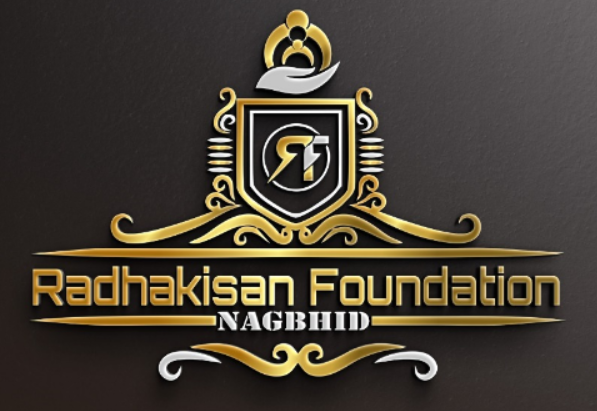Radhakisan Foundation, Nagbhid
Registration No. Chandrapur/000240/2023 & F:0016099(CDP) Year of Establishment :- 2023

Good Governance
- Home
- Good Governance
Good Governance at Radhakisan Foundation, Nagbhid
Good governance is a cornerstone of the Radhakisan Foundation, Nagbhid, ensuring transparency, accountability, and effective management in all its operations. The foundation adheres to the principles of ethical conduct, stakeholder involvement, and sound decision-making, creating a framework that supports the foundation’s mission of rural empowerment and community development.

- Transparency and Accountability:
The foundation maintains open communication with its stakeholders, providing regular updates on its programs, financial status, and outcomes. Clear and transparent reporting mechanisms ensure that donors, beneficiaries, and partners are well-informed and confident in the foundation’s work. - Participatory Decision-Making:
The governing body involves community representatives, local leaders, and experts in key decisions, ensuring that the needs and voices of the rural population are central to the foundation’s initiatives. This participatory approach fosters inclusivity and strengthens the relevance of the foundation’s programs. - Efficient Resource Management:
The foundation prioritizes the efficient use of resources, ensuring that donations and grants are utilized effectively to support its initiatives. Regular audits and financial oversight ensure the proper allocation of funds for maximum impact. - Sustainability and Long-Term Impact:
The foundation is committed to creating sustainable development models that empower communities. Governance practices focus on building capacity within local communities, ensuring that programs have long-lasting effects and are not reliant on external support. - Through these governance principles, Radhakisan Foundation ensures the integrity, effectiveness, and sustainability of its work, creating a lasting impact on the lives of rural people in Nagbhid and surrounding areas.
Practising Good Governance
Making Policies & Decisions
Radhakisan Foundation, from the inception itself, works on a delegated work environment. Each and every person in the organization is involved in the process of decision making in a scientifically designed system.
Making Policy & Decision in the Foundation are done through a four tier system.
- Departments & Divisions:- Monthly review meetings are held for each division and department regularly.
- Executive Committee :-The Executive Committee manages the Foundation’s operation directly and it reports to the Board of Advisors. Members of this committee are professionals working with Radhakisan Foundation and it is mandatory to include a member from the Board of Advisors.

The Executive Committee of Radhakisan Foundation holds a meeting each Quarter (every three months) and looks after day to day management.
- Advisory Body
The Board of Advisors comprises of technically competent people from diverse backgrounds and expertise. The body is formed for a period of one year and a few independent members with eminence and reputation are nominated each year. Members of this board also meet once every Quarter.
The Board of Advisors advises the Trustees of Radhakisan Foundation, taking regular inputs from the Executive Committee. - Board of Trustees
The Board of Trustees sets the vision and broad guidelines for the Foundation and ensures good governance in liaison with the Board of Advisors; although, the Board of Trustees is not involved in the day to day operation of Radhakisan Foundation.
Credibility Norms
Radhakisan Foundation encourages its partners to follow Credibility norms for ensuring good governance in the development sector. Radhakisan Foundation also follows norms of good governance itself. The Foundation strives to build capabilities of its grassroots NGO partners towards good governance. The Governance & Credibility System includes a systematic set of norms, which is administered and monitored by a qualified Company Secretary.
Project Management & Monitoring system
The project management & monitoring system in Radhakisan Foundation comprises of a systematic and well laid down processes. These are as follow –
- a) Selection of NGO Partners
Partners are invited selection of partners for required locations under specified programme through advertisement in relevant forum, websites; and also through reference from credible partners as well as perennial ‘submit a proposal’ section in Radhakisan Foundation website. Also, prospective partners keep on submitting proposals directly to the foundation round the year. Initial selection is done on these bases. - b) Desk Appraisal
Prospective proposals are put through the desk appraisal process at respective programme divisions. - d) Monitoring
Once a partner is selected under a particular programme, an MoU is signed, guidelines and initial trainings are imparted and the particular project is started. The project is put under a systematic and periodic monitoring system. The processes include the following steps: - Project Auditing ii. Activity report analysis iii. Field evaluation
The process of project monitoring is followed by impact analysis, which is a done internally; and external evaluation, done by an external and professional agency. - e) Impact analysis
- f) External evaluatio
Audit System
Radhakisan Foundation has a four tier audit system to ensure that funds are utilized to the optimum level in an accountable manner.
- Internal & Process Audit System – This is conducted throughout the year in order to ensure accountability in the internal operation of the organisation
Internal & Process Auditors (Chartered Accountant) - Statutory Audit– is held by the statutory auditor for finalization of balance sheet and statement of affairs. This is also done to comply with standard statutory norms.
Statutory Auditor(Chartered Accountant) - External Evaluation:
On the basis of need, impact and outcome of various welfare programmes of Radhakisan Foundation are evaluated by external evaluation agencies having relevant experience on the subject.
- Governance Compliance Certification: Chartered Accountant- Audit reports are discussed with the Board of Trustees, Advisory Body and the Executive Committee to take suitable and necessary steps if required.
Use of Technology for Good Governance
- a) Online Monitoring System
Radhakisan Foundation advocates use of technology for ensuring impartial monitoring and to cut down over head cost. Radhakisan Foundation has already started the system in a few of its national level programmes. Gradually, all its projects will be compatible with this system. The biggest challenges so far have been lack of access to technology in remote project areas and lack of working knowledge among grassroots NGO partners. The Foundation is taking up the task of building capacities of all its NGO partners and project staffs. - b) Beneficiaries Management System
A successful beneficiary management system is oadopted. This technology is helping Radhakisan Foundation in tracking the progress and development of all the beneficiaries in two major national level programmes as of now. - c) Microsoft Groove – the decision making software
Radhakisan Foundation practices participatory and democratic decision making process, which involves all possible professionals in the organisation. - d) Management Information System (MIS)
A monthly MIS is prepared and analyzed by the MIS Officers and it is submitted and discussed in Executive Committee meetings for assessing the operational activities and to do future planning. - e) Accounting System
With increasing use of relevant technology in each division and department, along with projects, both quantitative and qualitative MIS are managed technologically. The Accounts Team of Radhakisan Foundation consists of competent and qualified accounts professionals. The accounts are maintained on daily basis through advanced and updated computerized systems. The same is also analyzed and checked periodically by the internal control system and Internal Auditor, in compliance with standardized HR and Management Policy.
2600
MEMBERS
1100
VOLUNTEERS
510
EVENTS
1500
Satisficed Donors
Help People in Need
Become a Donate Member

Radhakisan Foundation, Nagbhid
Radhakisan Smruti, Krushinagar, Sulezari, Nagbhid, Chandrapur, Maharashtra, India – 441205